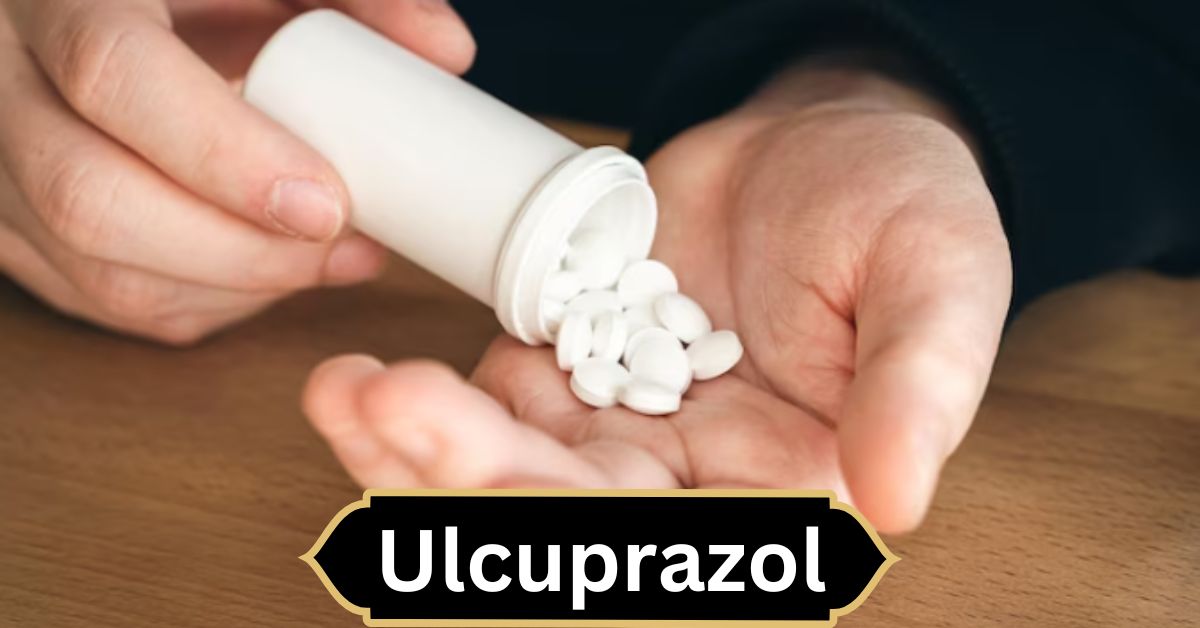Understanding GERD:
Gastroesophageal Reflux Disease (GERD) is a chronic condition characterized by the frequent flow of stomach acid back into the esophagus. This acid reflux causes irritation and inflammation, leading to symptoms such as heartburn, regurgitation, chest pain, and difficulty swallowing.
GERD can significantly affect the quality of life and may lead to more serious complications if not properly managed. These complications can include esophagitis (inflammation of the esophagus), esophageal ulcers, and a precancerous condition known as Barrett’s esophagus.
Several factors contribute to the development of GERD, including obesity, pregnancy, smoking, certain medications, and dietary habits. Foods such as chocolate, caffeine, spicy foods, and fatty meals can trigger or worsen GERD symptoms.
Identifying and avoiding these triggers, along with seeking appropriate medical treatment, are essential steps in managing GERD effectively.
The Mechanism of Action of Ulcuprazol:

Ulcuprazol, a proton pump inhibitor (PPI), is commonly prescribed to treat GERD by significantly reducing stomach acid production. It works by inhibiting the hydrogen-potassium ATPase enzyme system (the proton pump) found in the gastric parietal cells.
This enzyme is responsible for the final step in the production of gastric acid. By blocking this enzyme, Ulcuprazol effectively decreases the overall acid secretion in the stomach.
This reduction in stomach acid helps to alleviate the symptoms of GERD and promotes the healing of the esophageal mucosa. By maintaining a less acidic environment, Ulcuprazol allows the damaged tissues in the esophagus to recover, reducing inflammation and preventing further damage. This action is crucial for both symptom relief and long-term management of GERD.
Quick Symptom Relief
One of the primary benefits of Ulcuprazol is its ability to provide quick relief from the distressing symptoms of GERD. Many patients report a noticeable reduction in heartburn and acid regurgitation within the first few days of starting treatment. This rapid symptom relief is particularly important for improving the daily comfort and well-being of individuals suffering from GERD.
The effectiveness of Ulcuprazol in quickly alleviating symptoms makes it a preferred choice for those seeking immediate relief. By reducing the frequency and severity of acid reflux episodes, Ulcuprazol allows patients to enjoy meals, sleep better, and engage in daily activities without the constant discomfort of GERD.
Also read: Tom Segura Net Worth – A Comprehensive Overview!
Restoration of Esophageal Mucosa
Beyond symptom relief, Ulcuprazol plays a critical role in the restoration of the esophageal mucosa damaged by chronic acid exposure. The healing of the esophageal lining is essential for preventing complications associated with untreated GERD, such as strictures (narrowing of the esophagus) and Barrett’s esophagus.
Ulcuprazol’s ability to maintain a less acidic environment in the stomach allows the esophageal tissues to heal and regenerate. This healing process is vital for restoring normal esophageal function and reducing the risk of long-term complications.
Patients who adhere to their Ulcuprazol treatment regimen often experience significant improvements in their esophageal health, contributing to a better quality of life.
Safety and Tolerability
Ulcuprazol is generally well-tolerated by most patients, with a favorable safety profile. Common side effects are typically mild and transient, including headaches, nausea, diarrhea, and abdominal pain. These side effects usually resolve on their own and do not require discontinuation of the medication.
Long-term use of Ulcuprazol is considered safe for most patients, although it is important to follow medical advice and undergo regular check-ups to monitor for any potential adverse effects.
Some studies have suggested a potential association between prolonged PPI use and certain risks, such as vitamin B12 deficiency, bone fractures, and kidney disease. However, these risks are relatively low and should be weighed against the benefits of effective GERD management.
Patients should always discuss their full medical history and any other medications they are taking with their healthcare provider to ensure Ulcuprazol is the right choice for them. Monitoring and adjusting the treatment plan as needed can help optimize the benefits while minimizing any potential risks.
Considerations and Patient Care:

When considering Ulcuprazol for GERD treatment, several factors should be taken into account to ensure optimal outcomes. Patients should adhere to the prescribed dosage and duration recommended by their healthcare provider.
Taking the medication as directed is crucial for achieving the desired therapeutic effects and preventing relapse of symptoms.
In addition to medication, lifestyle changes play a significant role in managing GERD. Patients are encouraged to make dietary adjustments, such as avoiding trigger foods and eating smaller, more frequent meals.
Weight management is also important, as excess weight can contribute to increased pressure on the stomach and exacerbate GERD symptoms.
Avoiding smoking and limiting alcohol consumption are other essential lifestyle modifications. Smoking can weaken the lower esophageal sphincter, allowing stomach acid to flow back into the esophagus more easily.
Alcohol can also relax the sphincter and irritate the esophageal lining, worsening GERD symptoms.
Regular follow-up with a healthcare provider is important to monitor the effectiveness of the treatment and make any necessary adjustments.
Open communication between patients and healthcare providers helps address any concerns or side effects that may arise during treatment. By working together, patients and providers can develop a comprehensive plan to manage GERD effectively and improve overall health.
FAQ’s:
1. What is GERD?
GERD, or Gastroesophageal Reflux Disease, is a chronic condition where stomach acid frequently flows back into the esophagus, causing irritation and inflammation.
2. How does Ulcuprazol work?
Ulcuprazol works by inhibiting the proton pump in the stomach, reducing acid production and helping to alleviate GERD symptoms and promote healing of the esophageal lining.
3. How quickly can I expect relief from GERD symptoms with Ulcuprazol?
Many patients experience noticeable relief from GERD symptoms, such as heartburn and regurgitation, within the first few days of starting Ulcuprazol treatment.
4. Is it safe to take Ulcuprazol continuously?
Ulcuprazol is generally well-tolerated and considered safe for long-term use, although patients should have regular check-ups with their healthcare provider to monitor for potential side effects.
5. What lifestyle changes can help manage GERD along with Ulcuprazol?
Lifestyle changes such as avoiding trigger foods, eating smaller meals, managing weight, quitting smoking, and limiting alcohol can significantly help in managing GERD symptoms.
Conclusion:
Ulcuprazol is a highly effective treatment for GERD, offering rapid symptom relief and promoting the healing of the esophageal mucosa. Its favorable safety profile and tolerability make it a popular choice for many patients. By combining Ulcuprazol with appropriate lifestyle modifications and regular medical supervision, individuals with GERD can achieve significant improvements in their quality of life and long-term symptom control. Consulting a healthcare provider is essential to determine the best treatment plan for managing GERD effectively.
Related Post:
- Also read: Autumn Falls Age – What You Need to Know!
- Also read: Brooke Markham – From Oregon to Stardom!



